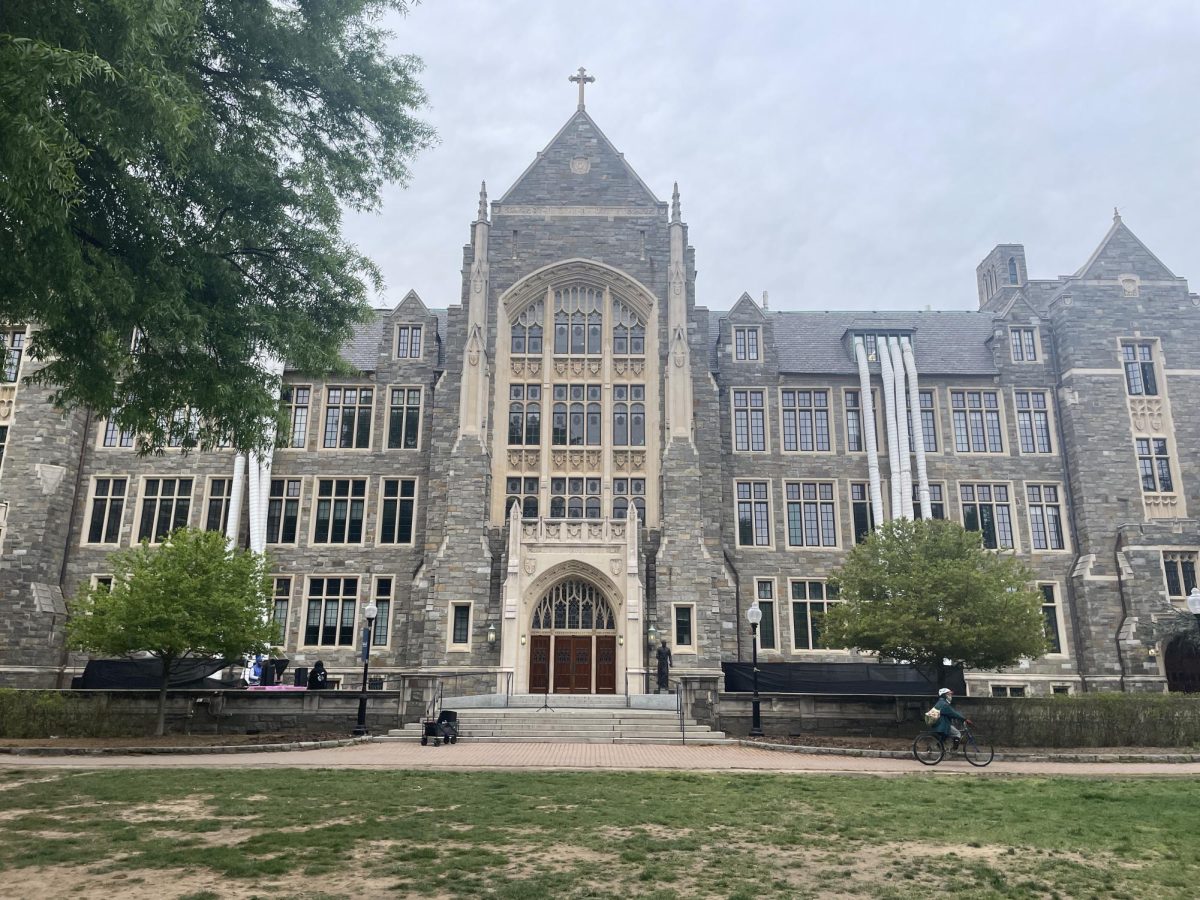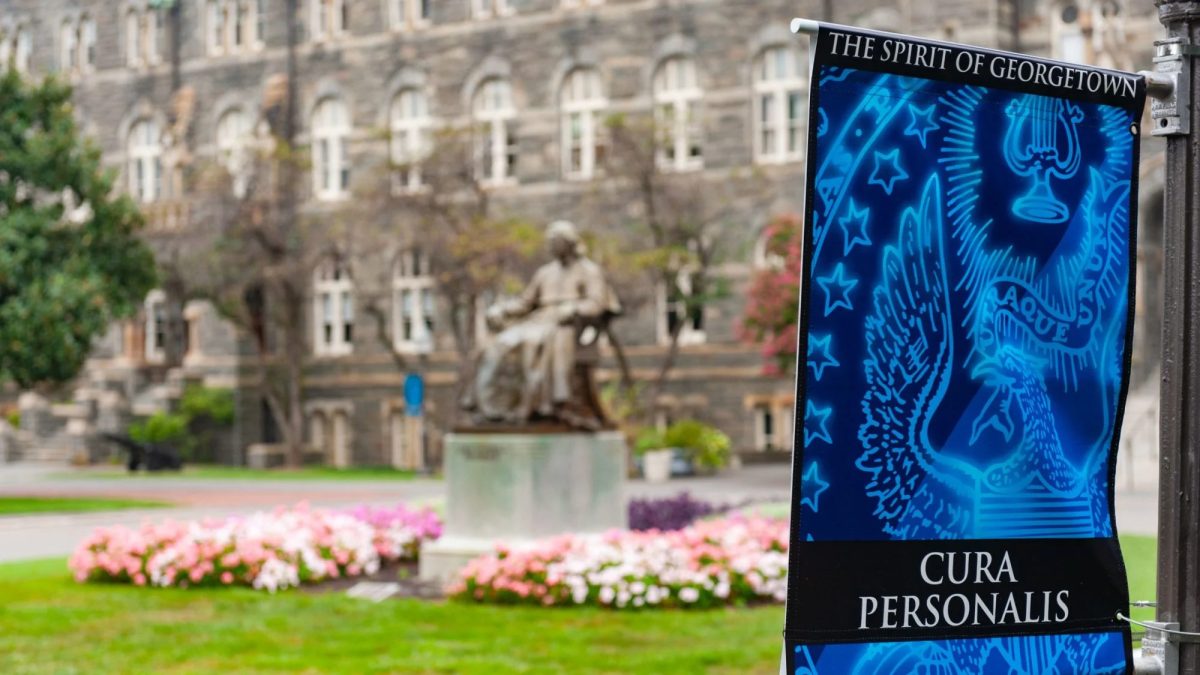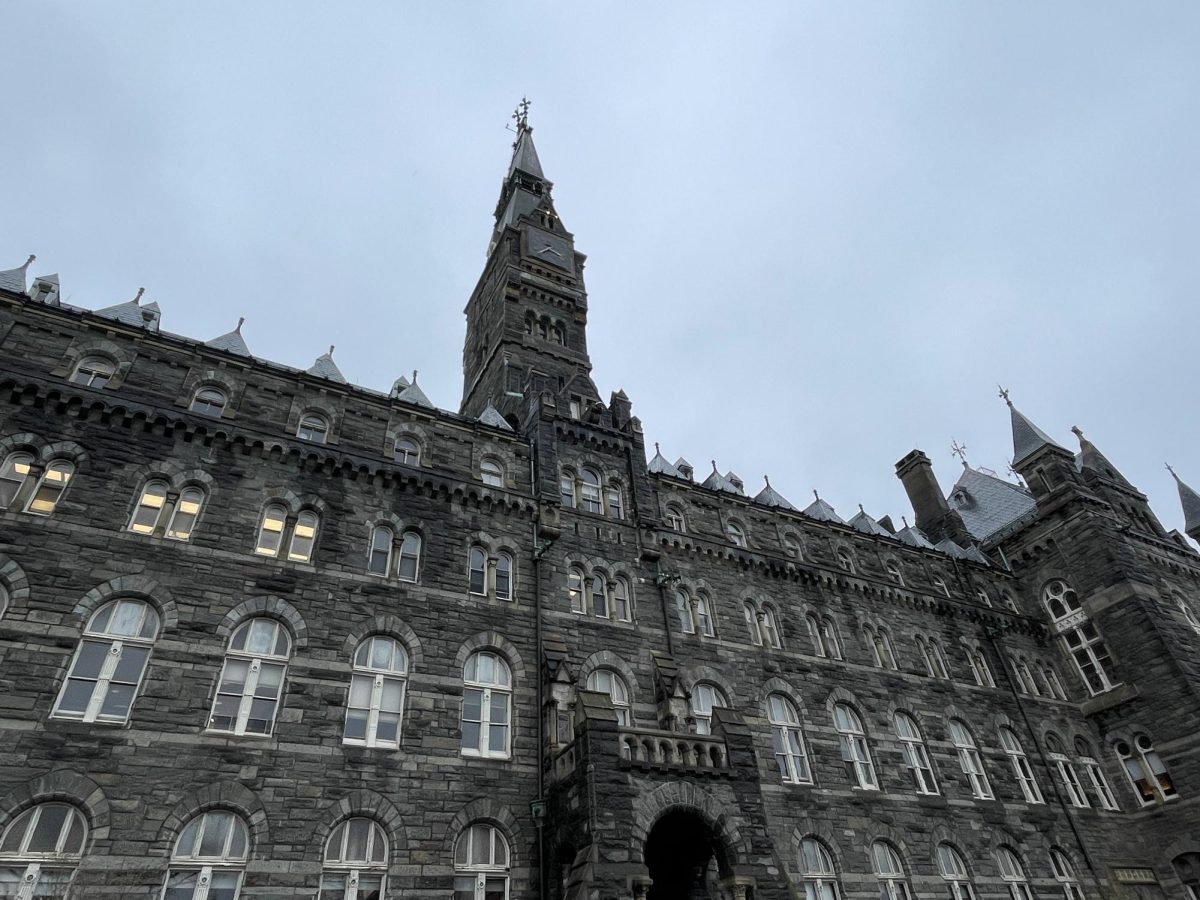Drawing from backgrounds in activism and organizing, executive election ticket Nile Blass (COL ’22) and Nicole Sanchez (SFS ’22) is striving to achieve progress at Georgetown University that peers have warned is impossible.
Blass and Sanchez are not discouraged.
Blass and Sanchez, both current members of the Georgetown University Student Association, want to craft new initiatives around COVID-19 policies, reform the Georgetown University Police Department, enact programs that bring attention to the university’s slaveholding past and restructure GUSA.

The candidates are both well versed in the GUSA system, with Blass currently serving as provost of the Student Advisory Committee under President Nicolo Ferretti (SFS ’21) and Vice President Bryce Badger (MSB ’21), and Sanchez serving as an at-large senator, senior policy adviser to executive staff and member of the student activism team.
In addition to being involved in GUSA since her first year at Georgetown, Blass is a member of the Black Survivors Coalition, a student group advocating for Black women and nonbinary survivors of sexual assault. Blass also helped organize BSC’s #GeorgetownDoesntCare campaign, which called for the university to increase and improve resources for Black survivors of sexual assault, and included sit-ins in front of the office of University President John J. DeGioia (CAS ’79, GRD ’95).
Blass said she and Sanchez will draw upon their experiences with campus activism to restructure GUSA into a space that prioritizes all marginalized communities.
“We do a lot of work to represent not just our communities, but the various communities that exist in Georgetown,” Blass said in a Zoom interview with The Hoya. “If anything, what our marginalized identities inform isn’t that we have to prioritize ourselves, but that we understand what it is to not be prioritized, to not be seen, to not be heard.”
Sanchez was also involved with BSC, where she found a community after transferring to Georgetown her sophomore year. The work of BSC reminded her of the activist movements she joined at home in New York City, according to Sanchez.
“I was always involved, but I felt like Georgetown wasn’t the place for me to get involved until I saw the Black Survivors Coalition, and I saw a group of students so outraged and passionate that they got together and they organized,” Sanchez said. “It was the first time when I ever saw something so similar to the work I did back home that made me feel like maybe this is the place for me.”
GUSA executives must ensure all members of the Georgetown community, no matter their identity, feel as though they have a voice on campus, according to Sanchez.
“I know what it feels like to be that student that is disrespected and not heard of,” Sanchez said. “And I never want anyone on campus to feel like that, regardless of your identity and regardless of a community.”
Blass and Sanchez’s administration would push the university to include student voices in the reopening process and increase transparency around COVID-19 guidelines and the consequences of violating them, according to Sanchez.
“The school hasn’t truly made a big effort to publicize and really communicate with students what are the guidelines and what are the consequences,” Sanchez said in a Zoom interview with The Hoya. “The school probably already has plans of what they want to do and has already begun thinking of it.”
If elected, Blass and Sanchez would coordinate with activists and student groups on campus who have been working to reform GUPD. Allegations of hyperpolicing by GUPD and nationwide protests against the police killings of Black citizens have spurred calls for the practices of the campus police force to be reviewed. In June, the GUSA Senate passed an act establishing a student advisory committee to oversee GUPD.
Blass and Sanchez would build upon the work of the group, according to Sanchez.
“What they’re doing currently is collecting a lot of data and doing a lot of background research to understanding the creation of GUPD — how it was established and why it was established,” Sanchez said. “It used to be just a security detail on campus, and now it’s a full-on policing force, and to work with them and use the data they’ve created to figure out how we can reform GUPD and make this campus safer not just for students, but for administrators to feel comfortable with.”
Blass and Sanchez would also push the university to enact a reconciliation fee, which would go directly to descendants of the 272 enslaved people sold by the Maryland Province of the Society of Jesus in 1838 for Georgetown’s profit. Although the fee was endorsed by students in the 2019 GU272 referendum, the university chose not to enact it, instead proposing an initiative to support projects in descendant communities.
Enacting the referendum is important, considering the activism behind it, according to Blass.
“I still want to push for the enactment of the referendum, especially because it has a lot to do with institutional memory,” Blass said. “I think that was a really important cultural moment for Georgetown, but as we go year and year from it, you’re going to get to the point where there’s going to be no students on campus who even remember voting in that, and I think that that really impacts how this university moves.”
To bring more attention to Georgetown’s history of slaveholding, the Blass and Sanchez would seek to create markers that identify the gravesites of enslaved people on campus. The Georgetown area contains a number burial grounds, including those of enslaved people. In 2014, human remains were discovered during the construction of Pedro Arrupe, S.J. Hall, which is situated next to a gravesite where enslaved people were buried.
Further action items include adding Georgetown’s slaveholding history into the curriculum of New Student Orientation and demanding the university act on their proposed community-based project initiative for descendants of the GU272, according to their campaign website.
“We need to integrate the acknowledgment and history of Georgetown slaveholding legacy into every aspect of the Georgetown experience,” Blass said. “Not in a way of a guilt or shame dynamic, but in an acknowledgment that there is no education without these individuals whose sacrifice was involuntary.”
GUSA’s structure is another area in which Blass and Sanchez see room for an increase in inclusivity in order to combat student mistrust and indifference. In recent years, students have voiced frustration with student government at Georgetown, with some even spearheading a movement to abolish GUSA and replace it with a more efficient body. Former members of GUSA have also raised concerns about inadequate representation in the group.
Any student should be able to join GUSA, regardless of prior experience, according to Sanchez.
“I’ve been making it very clear that you do not need to be an activist already or an organizer already to be involved,” Sanchez said. “That’s not necessary because this is not a space that’s going to be gatekept or closed off to anybody. This is the space where you’re going to learn.”
Blass and Sanchez’s administration will achieve meaningful change in Georgetown students’ day-to-day lives, according to Sanchez.
“People have said it’s impossible, and we’ve come out with the impossible being done,” Sanchez said. “We don’t take no for an answer. We are fighters, simple as that.”



















